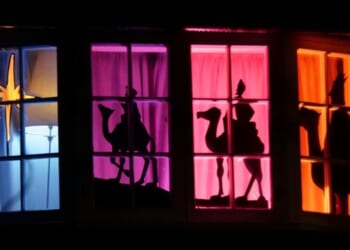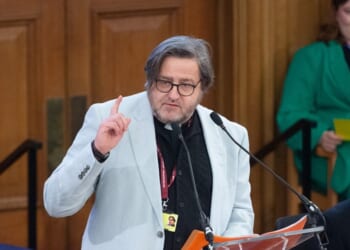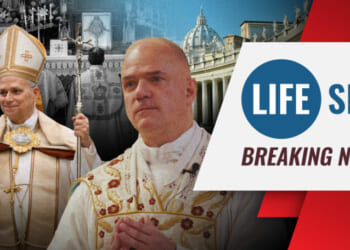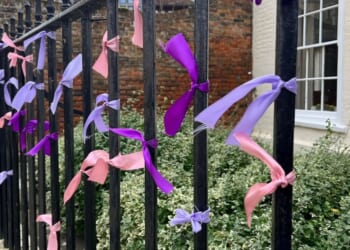The soul speaks
IT IS 75 years since The Lion, The Witch and the Wardrobe was published, and the former Irish rugby player Andrew Trimble is fronting a new documentary for RTÉ on C. S. Lewis as an Ulsterman. As I chose Lewis for Great Lives on Radio 4, and am, therefore, “out” as a Lewis fan, Trimble and his producer, Graeme Little, approached me to talk about Lewis’s move from academic to broadcaster.
Only one recording of Lewis’s wartime broadcasts exists. This survival is, in itself, miraculous: most of his addresses were given live, and the reason that any were recorded at all is because of a compromise. In 1944, the broadcast time was moved to 10.20 p.m. (“Who the devil is going to listen to anything at 10.20?” Lewis wrote in jocular indignation to his producer, Eric Fenn). That meant that Lewis had to catch the midnight train to Oxford, getting home at about three o’clock in the morning. He therefore agreed to give three talks live, and record three.
Although he longed for Ulster like a lost paradise (“Heaven is Oxford lifted and placed in the middle of County Down,” he told an Irish student, David Bleakley), in the recording Lewis doesn’t sound especially as if he’s from Belfast: his accent is typical 1940s RP. But this was not intentional. Lewis himself considered accents “simply accidental phenomena”, and said taht his own was “so far from voluntary that I have actually tried to retain my original North of Ireland — and apparently failed”.
I suspect that his Oxford accent testifies to the shattering trauma of his life. His mother died when he was nine years old; two weeks later, Lewis was dispatched to a boarding school in England, of which he later wrote that he “never hated anything as much, not even the front-line trenches in World War I”. He does not say, but I wonder whether, when he was expelled from his Eden, his Edenic accent was expelled from him.
Joy unconfined
SIR TONY ROBINSON has written his first novel for adults, The House of Wolf. Set in ninth-century Britain, it is the first in a trilogy telling the origin story of Alfred the Great, and reminded me of Ken Follett’s The Pillars of the Earth.
Lewis wrote that literature enables us “to see with other eyes, to imagine with other imaginations, to feel with other hearts”. Reading The House of Wolf, I was struck by the way in which Sir Tony both embodies other people’s experiences and evokes the physicality of the past. In other words, the novel is enriched by his life as an actor — creator of the world-famous character Baldrick, in Blackadder — and as a presenter of 20 series of Channel 4’s Time Team.
I interviewed Sir Tony about his life and work in the Assembly Rooms in Edinburgh, in September. As he leapt up to retell one anecdote, or explain another historical narrative, the audience cooed and laughed; and I realised that his great gift is that he brings people joy.
Passing glory
I WAS made for another climate. When many British people groan through the humidity of summer — made so much hotter by the climate crisis — I am like a lizard basking on a rock. Sadly, that means that for much of the rest of the year I bundle myself up in an improbable number of thermals and shiver in the breeze.
This means that I must resist the urge to find the gentle pull of autumn dismaying. The sight of unpicked blackberries withering on the branch, and green acorns turning brown on the paths, is a piquant symbol of the end of summer. But “every paradise is a paradise lost,” Marcel Proust wrote; or, as Robert Frost’s poem puts it, “Nothing Gold Can Stay”.
The swallows will disappear. Autumn will come, and, with it, another beauty arrive: morning mists, low sun, the changing colours of the leaves. Perhaps beauty is partly melancholic; perhaps the very loveliness of anything earthly rests on the fact that it does not last.
Signs of the times
PLUTARCH writes that Cleopatra, the last Pharoah of Egypt, died by her own hand, having smuggled an asp into her rooms in a basket of figs and let it bite her arm. But, for a new television series, I went to the Centre for Snakebite Research and Intervention at Liverpool University’s School of Tropical Medicine, to watch a venom extraction, and learned that a snake large enough to deliver enough venom to kill three adult women (Cleopatra’s two handmaidens died with her) would have been too large to be hidden in a basket of figs.
Nor is a cobra bite a sufficiently reliable way to take your own life: it might just as easily leave one in agony, badly injured, or even paralysed, as dead. And, rather than the two neat little marks that are supposed to have been the only sign on Cleopatra’s body to indicate how she died, the wound site would have been swollen and discoloured.
Science meets historiography in an attempt to solve this historic true crime. The forensic pathologist Dr Richard Shepherd explores the theories on a digital autopsy table, and, with a host of scholars, I examine the historical and archaeological evidence of the deaths of, in turn, Cleopatra, Tutankhamun, Genghis (Chinggis) Khan, and Alexander the Great. Confronting the records with medical and scientific knowledge is profoundly illuminating.
In Liverpool, I also learned the shocking fact that 100,000 people a year still die globally from snakebite, and that the method used to create the antidote — involving live horses — has not changed in a century. This is because it is largely a problem affecting poorer nations; so it is apparently not in the financial interests of pharmaceutical companies to invest in developing something more modern and effective.
The power of one
TRAVELLING into Headington, I passed over the patch of ground on which Lewis made a life-altering decision. He writes: “I was going up Headington Hill on the top of a bus. Without words and (I think) almost without images . . . I became aware that I was holding something at bay, or shutting something out. . . I could open the door or keep it shut. . .” It was his decision to open that door which led to his conversion to Christianity, to the wartime broadcasts, to The Screwtape Letters, to Narnia. How many lives were changed because of Lewis’s response to that awareness in his inner self?
In my Oxford interview, the great historian Professor Paul Langford asked me what Thomas Carlyle had had to say about the forces at work in history. Earlier that day, I had been idling through The Oxford Book of Quotations; so I knew exactly what Carlyle had said: “History is but the biography of great men.”
Carlyle’s view was very much out of fashion in 1996, and it could do with some serious tweaks now, but, over the years, my study of history has convinced me rather more than less of the immense power of the individual in world events. Whether that is for good or ill comes down, I think, to whether we are attentive to the quiet voice within.
Suzannah Lipscomb is a professor emerita of the University of Roehampton; a senior member of St Cross College, Oxford, and the host of the Not Just the Tudors podcast from History Hit. Ancient Autopsy is currently being shown on More 4.

















